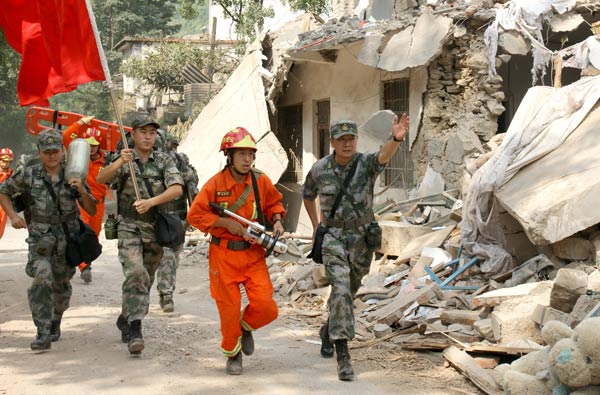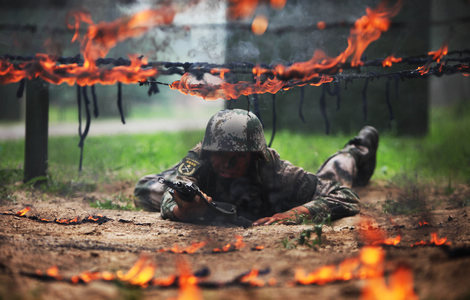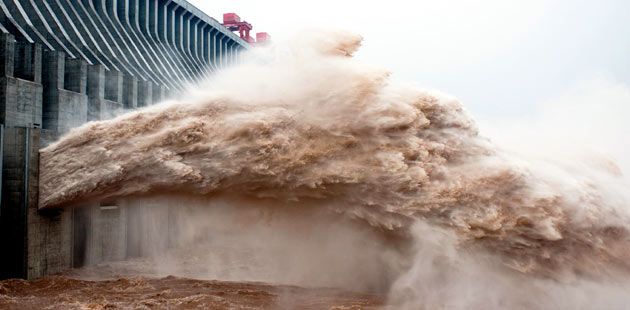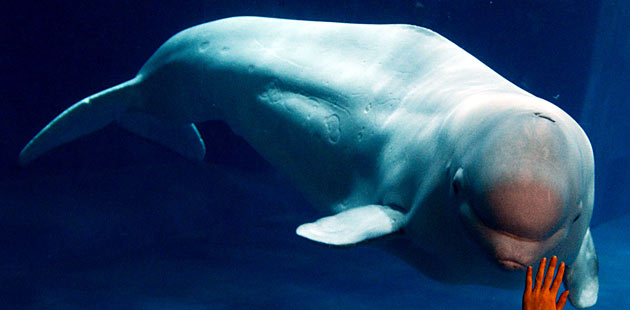Troops risk their own lives in quake rescue
Updated: 2012-09-14 08:03
By Guo Anfei and Xu Wei in Yiliang, Yunnan, and Wang Xiaodong in Beijing (China Daily)
|
||||||||
 |
|
Yu Yang (right), a senior colonel in the People's Liberation Army, leads soldiers in rescue work in Yiliang, Yunnan province. Provided to China Daily |
The devastation and heavy casualties in earthquake zones stir everyone's emotions, even rescuers working round-the-clock to save lives.
For Senior Colonel Yu Yang, who led more than 200 troops in Yunnan province into the hardest-hit area, the pain was compounded by the death of his father.
Yu received a call from his brother in Jiangsu province as his unit left Luozehe township, in Yunnan, which had been struck by two earthquakes on Friday, killing 81 people.
"My father has gone too soon. How I wish he could see me return home after the rescue mission is completed," said Yu, the commander of a People's Liberation Army infantry reserve unit.
Yu could not return for his father's funeral because his and another unit were sent to a different village to search for survivors.
Yu and his troops are among thousands of PLA soldiers serving as rescuers after magnitude-5.6 and magnitude-5.7 earthquakes thrashed Yiliang county.
More than 7,000 rescuers, including doctors and officials in Yunnan, and 4,000 soldiers stationed in nearby Sichuan province were sent to Yiliang soon after the earthquakes, according to local authorities.
PLA forces have been a key part of rescue and relief efforts after disasters in China.
Three days after a magnitude-7.1 earthquake in Yushu, Northwest China's Qinghai province, which killed more than 2,600 people in 2010, more than 7,000 PLA soldiers were deployed as rescuers.
When a magnitude-8 earthquake battered Wenchuan, Sichuan, in 2008, leaving more than 80,000 people dead or missing, some 150,000 PLA soldiers and armed police forces were mobilized to aid the rescue efforts.
The army is often among the first responders at disasters and has to face dangerous situations.
By Monday afternoon, more than 300 aftershocks had added to the damage in Yiliang. Along some sections of the road to Luozehe, which had been hit the hardest, survivors had to run at full speed to escape the boulders and sand that continued to fall from steep slopes, while troops marched into the town.
To minimize the risk of groups being injured by falling stones, soldiers got out of the vehicles and ran through some stretches of the road, with only the drivers remaining in the vehicles as they drove through, Yu said.
Peng Jianping led a PLA troop to Luozehe the night of the earthquakes. He found a body crushed under a smashed temporary shelter for mine workers.
"I could smell the body rotting in the hot weather," he said.
He cleaned blood from the body with bottled water and wrapped it in a white cloth. Then he carried it to a stretcher with several of his comrades and sent it to a vehicle a kilometer away.
It was more than Peng could bear when the group found another body and tried to carry it away - he vomited.
That night, Peng and his comrades recovered three bodies. Later, Liu Huiyan, vice-governor of Yunnan, expressed his appreciation to the unit.
Yu, who lost his father, said he was thankful for his mother's understanding.
"She told me it's hard for a soldier to fulfill his duty to his nation and his family at the same time," he said. "As a soldier, I must accomplish my mission and ensure the safety of my soldiers.
"Yu Yang is a real military man. He is always the first to head to the site for rescue after a disaster, putting his own life at risk, which proves his value as a soldier," said Yu's comrade, Yang Huaquan.
Contact the writers at guoanfei@chinadaily.com.cn










